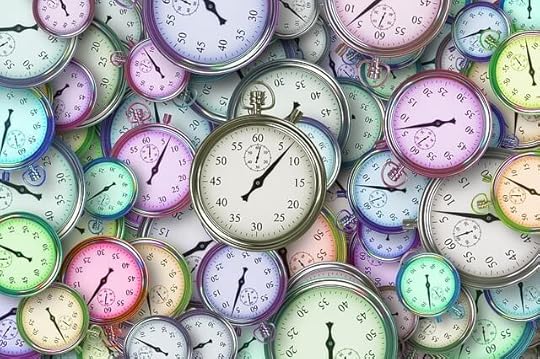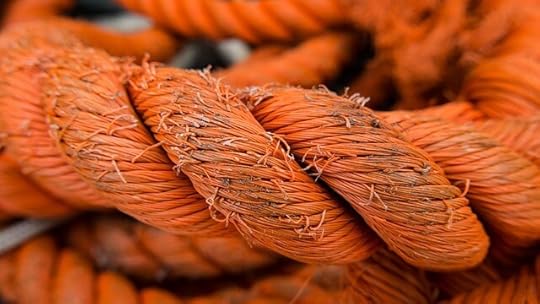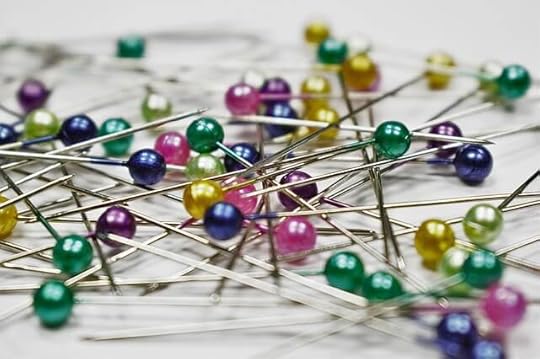Kris Spisak's Blog, page 12
August 16, 2019
Writing Tip 386: “Troubleshooted” vs. “Troubleshot”


Is this a “trouble-shot”? Depends on what’s hit, I suppose.
Does “troubleshot” make you think of that photo bomb that wasn’t your wisest decision? Is it a penalty kick in a tied game? Does it make you think of that last two ounces of tequila that you just shouldn’t have agreed to?
I’m okay with these definitions. I think they are all “trouble-shots” in their own way. But you know how you also need to think of “troubleshot”? It’s the past tense of “troubleshoot.”
Yep, it’s true.
To “troubleshoot,” as in to investigate and problem solve, works as a verb just like the word “shoot,” which is where this word derives—that combination of “trouble” and “shoot.” Today, you might shoot. Yesterday, you shot. It’s not tricky. I’m not quite sure where the confusion came from.
Once, this word was hyphenated (“trouble-shoot”), but now, “troubleshoot” is most commonly used as a single word. We’ve discussed hyphens dropped over time (from “on-line” to “pick-up“), and this is just one more example of that linguistic phenomenon.
What surprised me is that this word is much older than I assumed. It’s not a word of the same generation as “cyber” or “blog,” vocabulary babies of the dotcom era. “Troubleshoot” goes back over one hundred years to 1918, and it came from “troubleshooter,” which traced back to more than a decade earlier in 1905.
This begs the question of what was being troubleshot in this time period. That answer is surely the plot to a historical mystery series … one which I want to ponder … or perhaps you can take a stab at this one.
In the end, though, when you’re feeling stuck on “troubleshooted” vs. “troubleshot,” just remember that “shooted” isn’t a word. Therefore, neither is “troubleshooted.” You might see it written or hear it said, but this is just linguistic confusion in action.
Got it? I have no doubt that you do.
Happy writing, folks.
Join 800+ subscribers and sign-up for my writing and editing email newsletter for more tips like this.
The post Writing Tip 386: “Troubleshooted” vs. “Troubleshot” appeared first on Kris Spisak.
August 8, 2019
Writing Tip 385: “Flow” vs. “Floe”


Sure, your eye might land on the iceberg, but do you see all of those flat, floating sheets of ice? That’s what we’re talking about here.
Sometimes, you’ve just got to go with the flow, unless you’re riding along on an iceberg. Then, perhaps, it’s time to reconsider—your spelling among other things.
Actually, an “iceberg” is a bit misleading. When we’re talking about an “ice floe,” we’re not talking about giant mountains of ice.
Remember:
“Flow” can be a verb, meaning to move along—commonly in water—or to progress smoothly, among a few other definitions. As a noun, “flow” references that moving along or smooth progress, though it’s also picked up another meaning referencing your state of mind. “Flow state” is known as “being in the zone.” No matter which way you define it, “flow” has the same etymology as the words “flood” and “float.” It first appeared in the 12th century, coming from the Old English word flōwan, which held the same meaning, as related to moving water.
“Floe” refers to a large sheet of floating ice. If an iceberg is a floating mountain, then the ice floe is a floating plain. It has the same origin as the word “flake.” Both seem to come from the Norwegian word flo, meaning “flat layer.” Floe didn’t appear in English until the early 1800s, so it’s a baby word for all intents and purposes.
“Flo,” of course, is a nickname for “Florence,” a female name that stems from the Latin word florens, meaning “to blossom.” I’ve never heard of a city called Florence that’s abbreviated as “Flo,” but I won’t rule out that possibility.
Long story short, “Flo” and “floe” have little to do with each other. There aren’t many blossoms on a sheet of ice—though a floe might just flow along in the Arctic waters. As for “Flo” and “flow,” who knows? Maybe you know a Flo who’s really good at getting into her flow state. Maybe she’s great at “going with the flow.” (That’s actually a newborn expression if you’re curious. It came to be in the late 1900s.)
This “Flow” vs. “Floe” discussion is not to be confused with “flew” vs. “flu” vs. “flue,” and it is making me think a bit about the difference between “bitter cold” vs. “bitterly cold”—but we’ll leave those explorations for another day.
Happy writing, all!
Join 800+ subscribers and sign-up for my writing and editing email newsletter for more tips like this.
The post Writing Tip 385: “Flow” vs. “Floe” appeared first on Kris Spisak.
July 11, 2019
Writing Tip 384: Getting down to “Brass Tacks” or “Brass Tax”?



Is the expression, getting down to “brass tacks” or “brass tax”? Is this the hint you need? Maybe. Maybe not.
Here’s that moment when you pause and think: pennies are made of copper; nickels are made of nickel. Is there a coin made of brass? Or is there some brass purchasing tax we just aren’t aware of?
Or was it something of a different era? Did Robin Hood steal money from the rich and give to the poor all because of that brass tax? Or does this have to do with a tea party in Boston? No brass taxation without representation? No, that’s not right.
There are so many stories I could imagine here—though, okay, fine, I’ll stop now—but it’s time to get down to the truth of this:
The proper spelling of this expression is “brass tacks” not “brass tax.”
If you want to “get down to brass tacks,” that means to get down to the core of something or to get down to the issue or task at hand.
Where do these “brass tacks” come from? Now, there’s admittedly a bit of debate there—not quite an English language kerfuffle but definitely a small squabble.
The “getting down to brass tacks” origin theories?
In an era when haberdashery was a commonly used word (not just something a writer has fun writing for nostalgia’s sake like this moment for me personally), the shift from fabric sold by a rough “yard,” as in an arm’s length, to an exact repeatable measurement, as in precisely thirty-six inches, seems to have occurred in the 1800s. These measurements weren’t commonly made by yard sticks or rulers every time but by brass tacks that were put into tables or shop-keepers’ counters for easy access when laying out bolts of fabric. Thus, “getting down to brass tacks,” came from the “getting down to the precise details of the task at hand.” Maybe?
Fine leather furniture has used brass tacks for centuries, not only for their function but also their style. Fine Tudor furniture? Brass tacks all the way. Federalist era chairs? Brass tacks ever so subtle and sophisticated. However, if we’re “getting down to brass tacks,” that’s a bit confusing, because the brass tacks would be one of the last pieces added to the furniture to hold the fabric or final construction in place. They wouldn’t be something at the core of the structure, as the expression implies.
Cockney rhyming slang might have pulled “brass tacks” out of a phrase about “facts.” (Say it with the right accent and it works, trust me.) I do love language origin stories that come out of slang, but since most seem to believe that “getting down to brass tacks” is American in origin, it’s hard to get fully behind this theory.
The haberdashery answer is in the lead for me personally, but I’m not going to preach on it. You can choose your own adventure with this origin story for now.
The good news is that you don’t have to worry about your taxes. The bad news is that the language etymology mystery lingers. I’ll update you if it’s ever settled.
Happy writing, folks!
P.S. Thanks to the newsletter subscriber who submitted this question. I love questions from my readers. Let me know if you have one too!
Join 800+ subscribers and sign-up for my writing and editing email newsletter for more tips like this.
The post Writing Tip 384: Getting down to “Brass Tacks” or “Brass Tax”? appeared first on Kris Spisak.
July 4, 2019
Writing Tip 383: Apostrophes with “Years of Experience” & “Years’ Experience”


Time flies when you’re having fun. Maybe it’s true if you love your job. Maybe, it’s time to rewrite your resume. Here’s a hint that might just help your cause.
Resume writers can be baffled about where to put the apostrophe (or not) when writing about the experience of their years. Is there an apostrophe? Is there none?
Let’s settle this one and for all. Yes. And yes. How easy is that? Wait … let’s break this down.
If you understand possessives, as in the clock’s hands or the hands of the clock, you can largely understand how to properly punctuate this phrase.
The “hands” belong to the “clock.” In the same way, the “experience” belongs to the “years.”
Therefore:
If you have the experience of ten years in an industry, no apostrophe is needed.
If you have ten years’ experience, an apostrophe is needed.
If you have only one year’s experience, the apostrophe is needed, but it would appear before the “s” since it is a singular year.
Simple, right?
But it sometimes gets tricky when the possessive seems to flip-flop, because the following is also correct:
You have ten years of experience.
Oh no, now you’re thinking about the hands of the clock and the clock of the hands, and that simply doesn’t make sense. But in this case, it actually does.
You have ten years.
Ten years of what?
Ten years of experience.
So, in this phrasing, the “of” isn’t distinguishing possession, as it was in the earlier examples. In this latter wording, the “of” is working as a preposition in a different way, a function word explaining the specific aspect of the years being discussed. It now shows what these years are relating to.
We’re discussing years, as they are related to experience.
Ten years of experience.
Is this complicated? A bit.
Will there be a test on this before you get that job? Probably not.
But it’s the little things that can make you stand out in a competitive marketplace, so you’ve got to do your best. “Of” is a tricky word of innumerable definitions, but don’t let its versatility hurt the showcase of your own on your resume.
Good luck with whatever you’re working on, folks!
Join 800+ subscribers and sign-up for my writing and editing email newsletter for more tips like this.
The post Writing Tip 383: Apostrophes with “Years of Experience” & “Years’ Experience” appeared first on Kris Spisak.
June 28, 2019
Writing Tip 382: “Frayed Nerves” or “Fried Nerves”?


This rope isn’t fried. It’s frayed. Here’s hoping you’re not feeling either.
Your mind might feel fried, but what about your nerves? Are they fried too? Or are they something else?
This is an expression that goes back a couple centuries, but sometimes, the exact wording is misheard or misspoken.
Is it “Frayed Nerves” or “Fried Nerves”?
And have you been saying this correctly?
Answer:
Since the late 1870s, the phrase “frayed nerves” has been used to express a feeling of being worn down or irritated to a point of feeling a bit shredded.
If a rope is “frayed,” that means it has been strained and weakened, showing a bit of wear and tear. Sometimes, our nerves have the same feeling, when every last fiber of our being can feel on the edge of being undone. This is a metaphor, of course. If your nerves were literally frayed, we’d be talking about a greater medical issue. Even more so, if nerves were fried! Yikes!
The expression “to feel fried” is what often causes this “frayed nerves” versus “fried nerves” confusion. It’s a casual phrase, largely just used in the U.S., that means mentally exhausted. Your mind can be fried. Your brain can be fried. You can be fried. There is the other meaning referring to intoxication or being high, but there’s not usually frayed/fried confusion with that.
But when it comes to your nerves, those aren’t fried. They are frayed.
Though, I hope they aren’t in this moment. In this moment, here’s hoping they are actually “nerves of steel” (a phrase that’s been around since about 1800).
English language confusion-induced frazzled states are never a good thing. And if that’s how you’re feeling, I’ve got a great resource that can help with that.
Happy writing, folks!
Join 800+ subscribers and sign-up for my writing and editing email newsletter for more tips like this.
The post Writing Tip 382: “Frayed Nerves” or “Fried Nerves”? appeared first on Kris Spisak.
June 20, 2019
Writing Tip 381: “Beside” vs. “Besides” the Point


These pins might be beside a pin cushion, but they are not besides it.
Some English language questions feel a bit prickly, but this shouldn’t be one of them.
As similar as they might appear at first glance, the debate between “beside” vs. “besides” is not similar to that of “toward” vs. “towards” or “backward” vs. “backwards.” Most of these are words that show physical relationships (ahem, “prepositions” for those who care about formal names), but one of these things is not like the other. Do you know which one?
You could move toward a craft table or towards a craft table, depending on whether you prefer British English or American English (thank you, Ben Franklin), but “beside” and “besides” are different. They have unique meanings.
“Beside” means “by the side of” or “compared with.” For example, “the thread is beside the pins” or “beside some professional-looking Pinterest posts, my craft projects look quite plain.”
“Besides” can mean “except,” as in “there’s no way to do this besides taking it slow”; it can mean “in addition to,” as in “besides writing about grammar, I do enjoy an occasional DIY challenge”; it can also act as an adverb, with “moreover” and “furthermore” as synonyms, as in, “besides, my works in progress usually are a lot of fun.”
So, considering these definitions, if you’re writing the idiom meaning that something is off-topic,
the correct usage is “beside the point.”
Whatever is being said is not on topic. It’s beside the topic. It’s perhaps near the point. It’s perhaps miles from the point. Wherever it may be in relation to the discussion at hand, “beside the point” is what you’re looking for.
If the wording was “besides,” it would not have the same meaning. That makes me think of a segue into a conversation about “the point” (perhaps the point of colorful pins?). “Besides, the point!” Or, “besides, the point?” The excitement, sarcasm, or confusion in those statements can be up to you. And if you’re having trouble seeing the difference, swap out the “besides” for “furthermore.” “Furthermore, the point!” Do you see the difference?
Of course you saw coming that these two words are etymologically related. “Beside” entered the English language in the 1200s from the Old English word pairing be sīdan, meaning “by the side of.” “Besides” arrived in the 1400s, and it has shared the same meaning as “beside” in the past. However, it does not today, so please be aware of their differences.
Correct word usage is never beside the point—at least in communications where you want to be taken seriously.
Questions? My book and I’m here to help!
Join 800+ subscribers and sign-up for my writing and editing email newsletter for more tips like this.
The post Writing Tip 381: “Beside” vs. “Besides” the Point appeared first on Kris Spisak.
June 13, 2019
Writing Tip 380: “Hurray” vs. “Hooray”

Hip, hip, hallelujah! No, that’s not right. But how do you spell the last word of this cheer of excitement?

You know that last day of school feeling? What’s the right word for that? And then, how do you spell it?
Hooray! Hurray! Huzzah! Yep, these are all versions of the same exclamation of joy, encouragement, or approval that sometimes just has to be vocalized.
The Oxford English Dictionary prefers “hooray,” noting it’s a version of “hurrah.” Merriam-Webster and Dictionary.com agree. The Cambridge Dictionary prefers “hurray,” noting “hooray” is a variant in the U.S. But what about you? What does your gut say?
“Hurray” vs. “hooray” is an oddly tricky question.
Here’s the answer:
While both “hurray” and “hooray” are considered correct spellings, “hooray” (H-O-O-R-A-Y) is the most commonly used.
If you dive into the history of these words, it’s been quite the battle. “Hurray” took the early lead in the 1680s; “hurrah” took over around 1700; “hooray” saw its first surge of popularity around 1720, with “hurrah” still battling close behind. While “hurrah” has a surprising lead in written English over time, when we return to the “hurray” vs. “hooray” battle (both of which are pronounced the same), “hooray” has been more commonly used (and has been the accepted standard by most sources) since the 1870s.
Man, I love a great ngram graph. Thanks, Google.
Writing Tip 380.2 – In Australian and New Zealand, “hooray” is also used as a form of goodbye.
So which do you use? And how do you use it?
Personally, I’m all about bringing back “huzzah”—which might just go back to a favorite spelling error of “definitely” written as “defiantly” (insert a nostalgic sigh; it’s one of my first writing tips).
But in the meantime, hip, hip, hooray! You’ve finally got your answer.
Happy writing, folks.
Join 800+ subscribers and sign-up for my writing and editing email newsletter for more tips like this.
The post Writing Tip 380: “Hurray” vs. “Hooray” appeared first on Kris Spisak.
June 2, 2019
S2: E10 – Nervous “Tics” & Nervous “Ticks” Plus Other Things That Make You Squirm (Besides Grammar)



So you’re telling me you think grammar is gross. You’re allergic to the idea of sentence diagramming. Actually paying attention to the English Language sounds kind of icky. Okay, sure, that’s not my opinion, but you knew that. And if it’s yours, that’s okay. I get it.
But you know what is icky to me? Lots of the creatures that seem to be coming out this time of year, and the problem is that the words we use about them often causes as much confusion as anything else.
This is episode 10, the final episode of season 2 of the “Words You Should Know” podcast. Time flies when you’re having fun, I guess. Let’s dive in.
Season 2, Episode 10: Nervous “Tics” & Nervous “Ticks,” plus other Things that Make you Squirm (Besides Grammar)
Approximate transcript:

Okay, sometimes my blog images scare me a little. This is another one of those times.
I have good news for you. Contrary to what you might have heard, there’s no such thing as a “poisonous” snake.
But here’s the bad news, this doesn’t make your next romp through leaf piles in the woods any safer.
Remember:
“Poisonous” means something that causes illness or death if eaten, touched, or inhaled.
“Venomous” means something that injects venom into another creature, most commonly through a bite or a sting.
The key difference here is that idea of injection. Snakes aren’t poisonous to the touch, if eaten (um… yikes?), or if inhaled (yeah, no clue why you’re sniffing snakes). It’s their venom that is dangerous. Hence, snakes can be venomous, not poisonous.
Admittedly, only ten percent of snakes are venomous, so maybe we all shouldn’t be as nervous around the slithering, fork-tongued creatures as we often are—though, if you ask me, I’ll still be steering clear of any that come across my path—whether or not they’re poisonous, whether or not they’re venomous, whether or not they’re offering apples, whether or not their bites are actually exacting (or extracting?) revenge. Too far? Honestly, I’m not sure you can convince me otherwise.
But these aren’t the only warm-weather creatures we need to be aware of—and yes, I’m still talking about word choice. Unfortunately, you’ll need your first aid advice elsewhere.

My intention was to include a picture of a tick here–as in the insect variety–but have you seen how creepy those things look up close? I couldn’t bring myself to do it. Thus, I present to you… a ticking clock. Perhaps still stressful but not nightmare inducing.
When the exterminator comes around, you might have a “nervous tick,” but if you’re referring to a sudden muscle spasm, you need the word “tic.” There are a few definitions to be aware of with these homonyms actually.
Specifically, a “tick” (noun) can be:
a bloodsucking arachnid (related to spiders, who knew?),
a recurring beat or click (as in a clock),
a small dot or check (perhaps marking something off of a list), or
a movement in the price of a stock on the Stock Exchange.
On the other hand, a “tic” (noun) can be:
a sudden muscle contraction (as noted above) or
a personal quirk.
I know this seems complicated. Clocks “tick-tock,” and you can play “tic-tac-toe”; where Rikki-Tikki-Tavi falls in the midst of this, I don’t know.
One little letter can make all the difference. Make sure you know what you’re doing.

When you start spotting a lot of these guys, do you know what you need?
So, I want to return to the conversation about nervous ticks and nervous tics. One might have a nervous tic when there are too many insects about, but a tick might be nervous if there is use of repellents/repellants.
But that begs the question:
How do you spell repellent/repellant? Repellant with an A? Repellent with an E?
Answer: “repellents”—with an “e.”
But before you confidently walk away from this “repellant” vs. “repellent” conundrum, let’s pause for a moment, because the other spelling isn’t completely incorrect.
What we have here is a case of preferred spelling versus accepted spelling. Both “repellant” and “repellent” are indeed words. Both have been used for over three hundred years. When I dug a bit deeper and looked into the Google Books Ngram Tool, it was confirmed that “repellent” is and almost always has been the more common spelling, with the exception of a strange outlier moment in history between 1722 and 1727 where “repellant” jumped ahead. What happened in these five years that almost but not quite changed the fate of this spelling, I have no clue.
“Repellent” and “repellant” trace back to the Latin word repellere, meaning to drive back. You can use insect repellent or have repellent behavior. I’d suggest being cautious with both, but at least you can feel confident in your spelling.
Getting your words right isn’t something that should make you shudder. Venomous snakes, ticks, mosquitoes that require repellent, sure. But words, no.
The whole idea of grammar police is a bit laughable. There are no red pens ready to circle your spoken words. Persnickety editors have their roles—I should know, I am one—but if you are someone working to better yourself, maybe what you eat, maybe how you exercise—why not how you use the English language?
If you ask me, words can change the world. A powerful story can stick into the wrinkles of your brain, lodging itself there and sinking in, giving you something to return to again and again. This is why people have told stories around campfires long before there were roasted marshmallows and s’mores involved.
Even before there were cave paintings, there were stories. There were words. This is how we connect. Let’s keep at it. And let’s do it well.
Who’s with me?
I’ll be back for season 3 in a few months, folks.
Join 800+ subscribers and sign-up for my writing and editing email newsletter for more language tips and trivia like this.
If you like what you’ve been hearing, don’t forget to subscribe to this podcast (via Apple Podcasts, Android, Google Podcasts, Stitcher, or RSS) so you’ll never miss out on another word you should know. Many thanks to those of you who have taken the time to rate my show on iTunes or wherever you listen.
Words. Language. Communications. You’ve got this.
The post S2: E10 – Nervous “Tics” & Nervous “Ticks” Plus Other Things That Make You Squirm (Besides Grammar) appeared first on Kris Spisak.
May 23, 2019
Writing Tip 379: “Distinct” vs. “Distinctive”


What is distinctive about the kitten in the middle? There is a distinct color that distinguishes her from her litter-mates. You could say she’s distinctively colored. Or you could forget all this and just go cuddle a kitten…
It is my distinct pleasure to dive deep into the distinct differences between “distinct” vs. “distinctive.” How do we distinguish one from the other? What is distinctive about each? How are “distinct,” “distinctive,” and “distinguished” not so distantly related? It’s time we figured this out.
I know I’m not the only one who’s written the word “distinctive” and then paused—convinced it should actually be “distinct,” or should it be?
Here’s what you need to remember when these two words start to feel complicated:
“Distinct” commonly means “unique” or “different,” or it refers to a quality that would be easily observed or recognized. If you hear a distinct sound, that means you definitely heard something that stood out amid any other noises. If you see a distinct motion in the darkness, that means that you definitely saw something. And perhaps you should run. Or perhaps it was just an adorable kitten being mischievous when no one would see it getting into trouble.
“Distinctive” often refers to a quality of a whole that makes it stand out. For example, a writer could have a distinctive voice. Your favorite craft beer could have a distinctive flavor. A cat could have a distinctive meow that is discernible from the others. Or maybe it’s less of a meow and more of a yowl—in which case, good luck with that.
These aren’t the only definitions of these two words, but these are the definitions where the meanings sometimes seem most muddled.
Both “distinct” and “distinctive” have been around for a long time, the 14th and 15th centuries respectively. Now, that’s a lot of time for confusion between the two, but it is what it is. They are close etymological neighbors but not exact synonyms. I repeat: not exact synonyms.
“Distinguish” also arrived into English in the 15th century, with the “distinguished” form not appearing until 1714.
Whether you call me distinguished in my quest for clarity in English communications or not is up for you to decide, but I know this is another distinct word usage question that has people curious. Is my answer distinctive? Maybe. But either way, it’s good to finally have this settled.
Now, I apologize if you’re allergic to all of these cats.
Join 800+ subscribers and sign-up for my writing and editing email newsletter for more tips like this.
The post Writing Tip 379: “Distinct” vs. “Distinctive” appeared first on Kris Spisak.
May 8, 2019
S2: E9 – Whippersnappers & the Birth Order of Grammar Rebels



I don’t know if birth order has anything to do with grammar persnicketiness. Do eldest children have a tendency of dotting their i’s and crossing their t’s? Are youngest children inclined toward utter grammar rebellion?
Was that first known person to drop an “OMG” in 1917—yep, I said that date correctly, 1917—was he a youngest child? I bet he was.
Was the member of One Direction who once jumped off the stage to correct the grammar on a fan’s sign an oldest child? I have no idea, but that’s my guess.
Here’s what I do know:
Lindley Murray, often called the “Father of Grammar” was an eldest child.
Noah Webster, American English renegade, was the 4th child out of 5.
Ben Franklin, English language revolutionary, was the 15th child out of 17. (Yikes, power to that mama…)
This is the Words You Should Know podcast, Season 2: Episode 9, and it’s time to go deeper.
Season 2, Episode 9: “Whippersnappers” & the Birth Order of Grammar Rebels
Approximate transcript:
Of course, I’m a youngest child, and we all know how I can dive deep into the correct matters of language. But for me it’s always a hunt, a quest, a matter of discovery. There is a right answer today, in this month, in this year. But that might not be the right answer fifty years ago. Or even one style book ago. Yes, the “i” of Internet can be lower case. That’s officially been okay for a few years now. Or at least it has been according to the Chicago Manual of Style. Sorry, tech guys arguing this. I hear you. I do. But sometimes, language simply evolves.
It grows up. Just like people.
What was it Mark Twain said? “Age is a matter of mind over matter. If you don’t mind. It doesn’t matter.”
But sometimes age order does matter. Or, at least it does when it comes to the words. For example, what about “oldest” and “eldest”?
 You know you’ve wondered about this. What on earth is the difference between “oldest” and “eldest”? Don’t they mean the same thing? Is this some ye old colonial spelling—like “ye” instead of “the”–that for some grammar-forsaken reason just refuses to fade into the linguistic history books?
You know you’ve wondered about this. What on earth is the difference between “oldest” and “eldest”? Don’t they mean the same thing? Is this some ye old colonial spelling—like “ye” instead of “the”–that for some grammar-forsaken reason just refuses to fade into the linguistic history books?
The answer is simpler than you realize.
“Oldest” and “eldest” do indeed have the same definition. The only difference is that “eldest” is used when referring to family relationships.
Do you have to use “eldest” in these situations? Of course not. There’s no grammarian coup over this distinction. However, it does explain why the word “eldest” brings to mind the Bennett sisters from Pride and Prejudice and Louisa May Alcott’s Little Women. It’s all about family relationships.
So whether you are the eldest sibling or the youngest, you finally have your answer—though, is anyone else bummed there isn’t some equally antiquated variation of “youngest” to match? Just me? I don’t believe it.
Now, when I think of those terms for the young, one of my favorite rarely used ones is “whippersnappers.” No, it has nothing to do with family relationships, but it’s a great one all the same. It has a lovely rhythm to it when rolling out of your mouth, perhaps best paired with an angry older voice, I know.
Of course, an overly-confident whippersnapper—sometimes even thought of as brazen or impertinent—has been called a “whipper snapper” since about 1700. It comes from a possible combination of “snipper-snapper,” as in a troublemaker out on the streets of Christopher Marlowe and William Shakespeare’s day, and “whip-snapper,” as in a youth who has nothing better to do than hang out snapping a whip.
Never been called a whippersnapper? How about this: have you have been called or simply felt “minuscule”?

Sure, he’s “mini,” but is he “miniscule”?
Itty bitty, tiny little hiccups in our writing might not always be noticed, but that doesn’t mean we still shouldn’t try to do better—even when some people say these mistakes are okay.
“Minuscule” is a big word with a tiny meaning. Literally. It means to be incredibly small. It comes from a diminutive of “minus,” or minusculus in Latin.
“Miniscule” is a confused spelling, taking the idea of “mini” and mixing up the words. “Miniscule” isn’t the standard spelling. If you were in a spelling bee, it would be considered incorrect. However, because this word is misspelled so often, it’s starting to become an alternate form. Mini-me probably isn’t behind the surge of this spelling faux pas, but maybe remembering his work with Dr. Evil might help you remember that this isn’t the accepted usage you’re looking for.
I know what you’re thinking: How can people simply make up a new spelling and have it become normalized because of misspelling it so often? Depending on your outlook, this is the awesome or disturbing thing about the English language over time. Just like “pleaded” vs. “pled,” “light” vs. “lit,” and “imbed” vs. “embed,” words and their spellings evolve. Heck, sometimes mistakes even replace the original logical forms entirely.
Will we see this with “miniscule”? Time will only tell. But until then, let’s try to get it right, folks.
Whether you’re the eldest or the youngest.
Whether you prefer your Internet with a capital “i” or not.
What does your birth order say about you and your grammar fussy tendencies? Does it play a role? Reach out to me. I’d love to conduct an informal poll on this one.
Whippersnappers, whippersnappers, whippersnappers. I can’t say it with a straight face … I guess I am the youngest child.
Join 800+ subscribers and sign-up for my writing and editing email newsletter for more language tips and trivia like this.
If you like what you’ve been hearing, don’t forget to subscribe to this podcast (via Apple Podcasts, Android, Google Podcasts, Stitcher, or RSS) so you’ll never miss out on another word you should know. Many thanks to those of you who have taken the time to rate my show on iTunes or wherever you listen.
Words. Language. Communications. You’ve got this.
The post S2: E9 – Whippersnappers & the Birth Order of Grammar Rebels appeared first on Kris Spisak.



